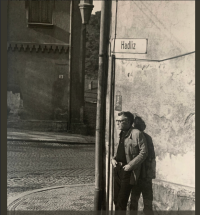Under communism, I was an idiot, the nineties were amazing.

Download image
Lubomír Kressa was born in Třebíč on 24 May 1963. His father was painter and sculptor Lubomír Kressa, a guest member of the art association Group 4. He was acquainted with evangelical pastor Tomáš Trusina and Alexandr Vondra, and also knew poet Ivan Martin Jirous. He transcribed samizdat books, including Magor’s Swan Songs, organised exhibitions not permitted by the regime with friends from artistic circles, and participated in underground events. After the revolution, he worked as a curator, his artistic ‘father’ was Ladislav Novák whose work he owns. He also organized several exhibitions about him. In 2014, the town of Třebíč recognised his lifelong stance. He lived in Třebíč in 2023.







